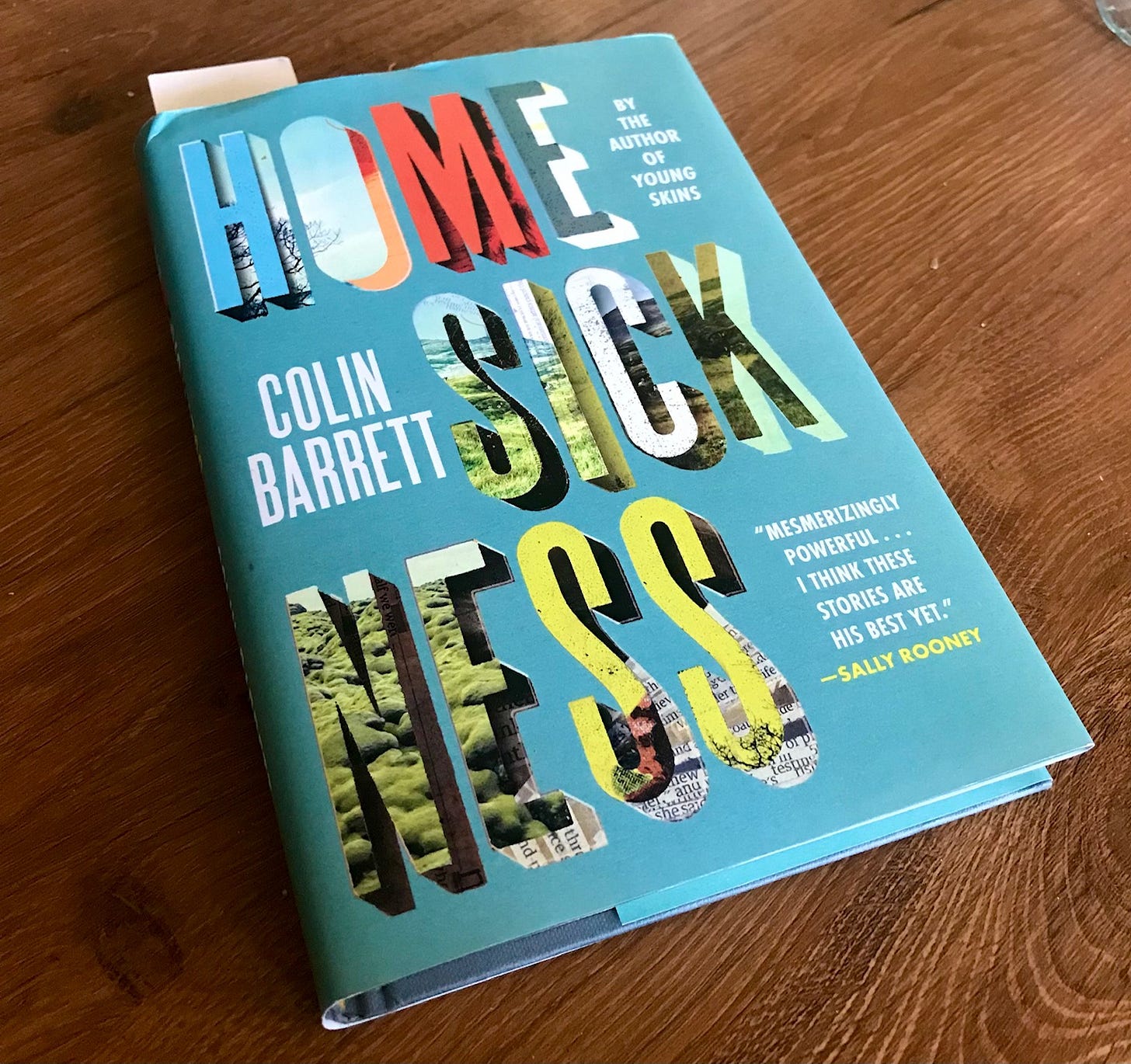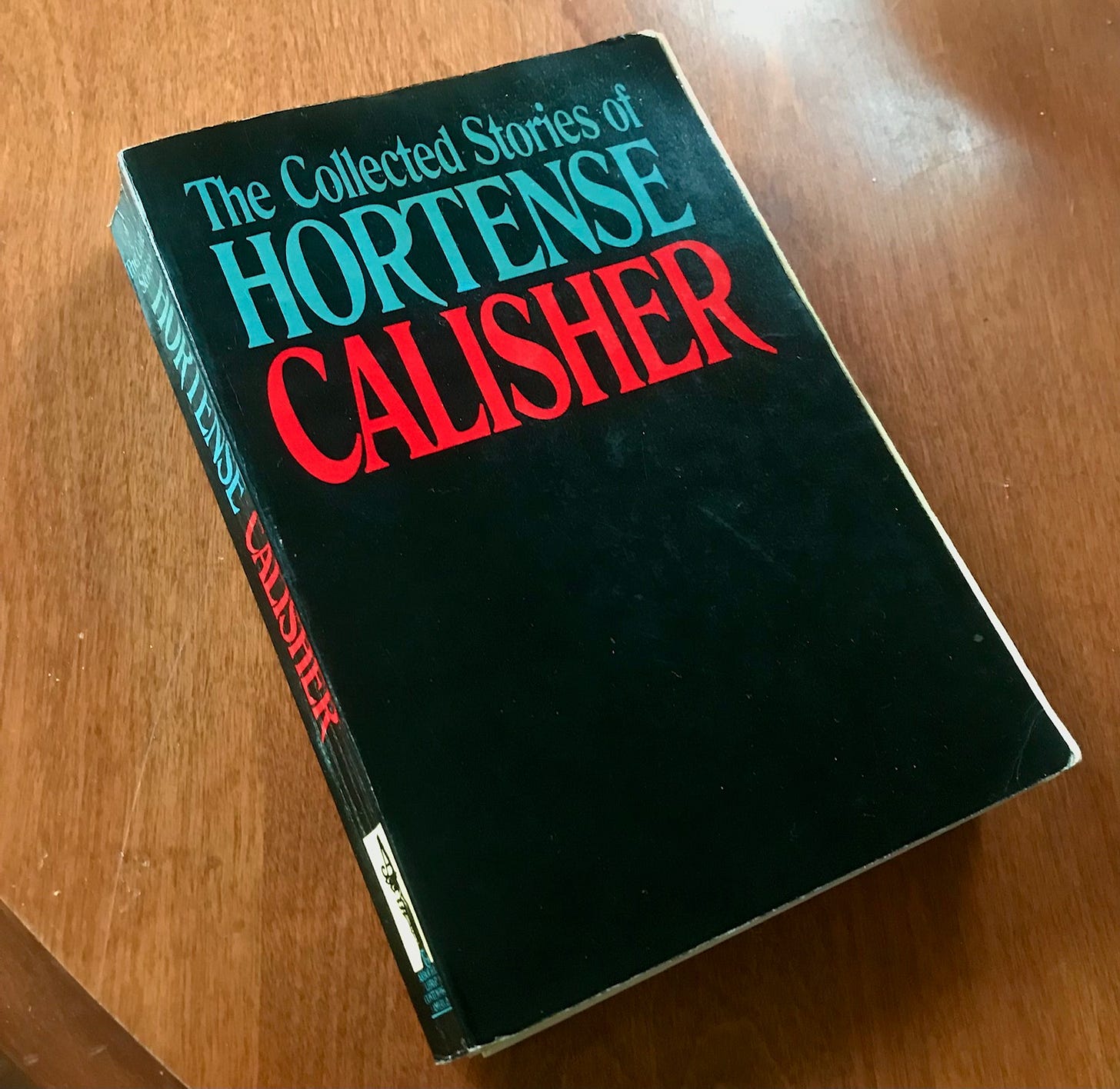Three reviews
Homesickness; mansionz 2; The Collected Stories of Hortense Calisher
Homesickness
Colin Barrett
Grove Atlantic, 2022
Colin Barrett has been heralded as one of Ireland’s finest young writers, despite his being 42, despite his being kind of a hack. The stoic Irish types in Homesickness are beset by violence or absurdity, yet remain unvaryingly stoic. An old farmer shoots a young trespasser, and the villagers keep about their business; an armed fugitive wanders into a rural pub, but the Guinness keeps flowing. It’s not realistic, and not quite funny — the humor mostly amounts to “So that just happened” in a workingman’s brogue.
It’s court-jester stuff, and I can imagine how a book like this comes to fruition. Barrett has entree into a specific, delicate poverty; he’s spent the latter half of his life in writerly academic spaces (patronized by Rolex, of all things) and has lost any sense of perspective. Homesickness is populated by regular folks — some bereft, some disabled, all a bit worse for wear — romanticized to the point of objectification. The clipped dialogue and clinical third-person narratives all but rob Barrett’s characters of agency. The drudgery is the point, but this is a deeply prescriptive text about the contemporary Irish. What do they feel? What do they fear?
Poverty is not, in itself, heroic — nor is labor tragic. It’s clear Barrett isn’t writing for the people he writes about, although it’s telling how many of his characters are middle-aged or older. They yearn, as one, for a bygone world; the thematic scope and stylistic conventions cohere into a fusty conservatism. Anyone who found Sally Rooney vapid can point to Barrett’s rolling pastures, his lowing livestock, his dwindling conversations over tea, and say, Well, what about this guy? He has the rhythms down, in the manner of a decent cover act. The Irish are a hardy, pragmatic people — got it. Make them sing!
mansionz 2
mansionz
Island, 2023
blackbear and Mike Posner are Instagram creatures — scuzzy, vengeful white guys with shitty tattoos — but mansionz is a Spotify phenomenon. You know that righthand panel on the desktop app, the feed that shows what your old Facebook friends are listening to? Even my normiest desk-jockey friends had “Wicked” and “Strip Club” playlisted in 2017. I doubt they knew it was Posner and blackbear; on Spotify, the songs are credited to pseudonyms. (They’re probably the first pop stars to benefit from Spotify’s vague attribution.) blackbear’s autotuned warble and Posner’s corn-fed falsetto straddle specific sounds in a frictionless way. If you’re not listening closely, the peppy instrumentals almost cloak the bald misogyny.
Remember when “Blurred Lines” came out, and the initial reaction was like, "Yeah, it’s kinda icky, but it’s cute because Robin Thicke and T.I. are cuddly Hollywood girldads”? Then Thicke and T.I. were outed as creeps, and everyone was like, “Ah, maybe no more smirking Top 40 hits about sexual assault.” So instead we have Drake, who lacks the charisma for a “Blurred Lines,” he’s the homesick dude in your freshman dorm who lurks in the stairwell to greet you on the way back from a party. The co-eds prancing across campus have awakened his desire; within months he will hate them with a fury that consumes his identity. Apparently this is all very relatable if your first name ends in -ayden.
I’ve listened to Posner and blackbear enough to know neither has a sense of humor. blackbear’s dead-eyed misogyny is so boring people aren’t even mad about it anymore; Posner is the sort of self-mythologizing millennial who sustains life-threatening injuries while staging the corniest PR stunts imaginable. Each is so eager to outdo the other that mansionz 2 sounds like a parody, even though it’s not. Take, for instance, Posner’s chorus on “Ride Die Eat Sleep Fuck Kill”: “First blowjob at the age of fifteen/Ever since then, I done been unleashed/Who you think you talking to? I know it ain't me/My whole life, only done four things.” Any 36-year-old man boasting about his junior-varsity exploits belongs in a padded room.
When they do attempt to be funny, it’s desperate edgelord shit. (Presented without comment: the outro “Cum ruined food for me. i tasted it & im hooked. sorry mom.”) Dick jokes and deathbed scenes arrive in the same breaths. And yet, and yet. As on the first installment, there’s a handful of absolute earworms I can’t get out of my head. “Annihilate” has this rapturous hook, the sort that’s been paying Posner’s mortgage for a decade — the man knows his way to a melody. It’s the same brooding penthouse narcissist schtick Drake’s been doing since Take Care, only Drake’s so fucking eager-to-please he can’t inhabit it fully. We’re all too old for this, but if you’re gonna be a villain you may as well be a supervillain.
The first mansionz album was a hit, if only within Spotify’s walls; I’ve never encountered these songs anywhere else. There’s something pure and populist about that. Despite Posner and blackbear’s successful solo careers, mansionz has engendered zero press to speak of: critics can’t reconcile the music with the optics. It’s like WWE’s relationship with sports media — journalists would rather leave it alone than contend with sickos who like this stuff. Just the same, mansionz 2 has done a tiny fraction of its predecessor’s traffic. Perhaps the algorithm changed?
The Collected Stories of Hortense Calisher
Arbor House, 1984 reissue
In 2022, after enduring a succession of disappointing new novels, I sought out some postwar fiction and came across Calisher’s name on a list of midcentury National Book Award finalists. Of her 23 novels, NYPL only had 2002’s Sunday Jews, which was an inauspicious entry point: an 800-page doorstop, it was Calisher’s final work, published after her 90th birthday. (Based on a cryptic reference in the book’s acknowledgements, I believe it was dictated orally to Calisher’s granddaughter.)
Nevertheless, I was astonished by the book’s scope, characters, and filmy exposition. Sunday Jews considers academia, globalization, and dementia on a maximalist scale; its diagnoses pertaining to Jewish-American politics feel grimly prescient from today’s vantage. Still the book is carried by Calisher’s light touch and subtle dialogue — it is, in spite of itself, a pleasure to read.
Calisher was, by any account, an anachronistic figure, oft criticized (if not dismissed) for her overwrought sentences. Admittedly, the sentences in The Collected Stories of Hortense Calisher1 pose an obstacle. I’ll transcribe a few from “Songs My Mother Taught Me,” to get it out of the way:
She was an exceedingly pretty young woman of about twenty-five with masses of blond hair arranged ingénue, and a pair of truly enormous blue eyes swimming in some Venus-lymph, clear natural nacre in which a man, or indeed any onlooker, might well sink. Words like “truly” came inevitably to mind as one regarded them. As I did so, they spilled over pellucidly. Casting a reproachful look at her partner (later it was understood that he had dared her), turning down the corners of a lovely mouth rosied with wine and — though one hated to think it — stupidity, she gazed at us, clutching the discarded portion of her costume, then hung her head and let fall on her lavishly ruffled broderie anglaise corselet two neatly schooled tears.2
You could convey this sentiment in half as many words, no? In Calisher’s stories, nothing is sacrificed for plot or pacing. I imagine the Wolfe-ian detail — the cataloging and taxonomizing — is grating in her lesser novels. Yet Calisher’s critics, I suspect, were moved as much by her fiction’s demographics. Most of her stories are solidly domestic, centering on unmarried women3 or lonely children observing the discontent of elders. On the surface, this may have lent an impression of frivolity. On the other hand, what’s more frivolous than Cheever and Carver’s alcoholic patriarchs?
Calisher’s sentences don’t really bother me, although I had to keep a dictionary close at hand. I don’t believe her intent was to impress or perplex: language is finite, so you may as well be precise. This same precision — of tone, of setting, of character — makes even the most plotless among Calisher’s stories hum. Sequenced in a cluster of New York-based stories, “Time, Gentlemen!” captures an intricate household dynamic, a patrician father countervailed by an ambitious mother. “The Coreopsis Kid” might’ve been a great novel, but its adolescent misgiving — terror in the face of time’s passage — makes it ideal for the short format.
There’s a becoming humility about the New York stories, a savory wistfulness that transcends narrative gimmicks. The writing holds up even if the subjects haven’t. Calisher was born in Manhattan in 1911; her father’s Jewish family had assimilated into high Virginia society. Ensconced in uptown communities, the Jews in Calisher’s fiction are virtually untouched by war or famine. Her city is crowded and segregated yet alluring, optimistic in its surging prosperity.
The anomalousness of Calisher’s Jewish identity — compounded by New York’s shuffling social order — obscures her politics, but the book’s speculative pieces offer glimpses. “The Rehabilitation of Ginevra Leake” is a miniature American Pastoral, a sympathetic chronicle of a Communist woman’s demise rendered in the first-person limited. (Calisher’s Communist is killed in a bomb plot; the Roth parallels are genuinely startling.) On its face, “In the Absence of Angels” is an anti-Communist parable, but its snapshots of working-class New York are scaldingly critical:
Lotte and I do not ever go back, of course, and we quickly forget the whole thing, for as the school year advances, the gap widens permanently between girls like us and those other unilluminated ones who are grinding seriously toward becoming teachers, for many of whose families the possession of a teacher daughter will be one of the bootstraps by which they will lift themselves to a feeling of security — that trust in education which is the dominant security in a country that prides itself on offering no other.4
Well, damn! If anything, the speculative stories would benefit from more conventional arcs — “The Summer Rebellion” is all preamble with no payoff. The collection is like a museum in that you find yourself grazing among masterpieces, overwhelmed by abundance, sensitive to the odd flaw.
Calisher was president of PEN America and the American Academy of Arts and Letters; she wrote for The New Yorker and The New York Times; her husband ran Yaddo. Between her modest themes and ornate mechanics, I’m not entirely surprised by her waning reputation. Her Collected Stories are a capsule into interstitial history, a happy interchange that minimizes the Depression and World War II. Most pertinently, there’s the matter of her publication history. Practically everything is out-of-print — this volume’s publisher, Arbor House, folded in the ’80s.
There’s a peculiar comedy-of-manners toward the end of the book, “Mrs. Fay Dines on Zebra,” in which Calisher’s narrator describes a humanitarian couple:
Thirty years of moving intercontinentally had not made them raffish — so far as was known they had never felt an expatriate tingle. What it had done was to give them the eternally pink-cheeked, good-tempered look of summer people; they had in fact been summer people all over the world. By native standards they should have been suffering from all the ills of cosmopolitan riches and ease; actually money, comfort and change had kept them amiable, enabling them to be as kindly as they looked, though considerably more worldly.5
This ideal — cosmopolitan romance embellished by New Deal affluence — shines forth from Calisher’s fiction. Just because it sounds like fantasy doesn’t mean it was.
I happened upon a 1984 paperback at Bruised Apple Books in Peekskill, good luck finding your own.
pages 357-358 in my edition.
In the manner of her peers, Calisher resisted the term “feminist”; there were appearances to keep up on the Upper East Side.
page 475.
page 418.




